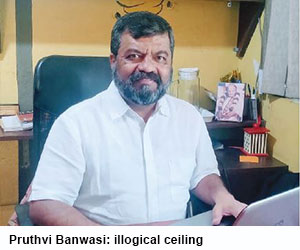 An out-of-the-blue statewide ban imposed by the Karnataka government on online teaching-learning in pre-primaries and lower primary (up to class V) schools on June 15, provoked mass outrage within middle class parents and teachers’ communities and resulted in a writ petition filed in the Karnataka high court by several private schools grouped under an informal alliance.
An out-of-the-blue statewide ban imposed by the Karnataka government on online teaching-learning in pre-primaries and lower primary (up to class V) schools on June 15, provoked mass outrage within middle class parents and teachers’ communities and resulted in a writ petition filed in the Karnataka high court by several private schools grouped under an informal alliance.
Stating that it had received several complaints from parents about children being compelled to spend long hours before computer terminals and digital devices, the state government imposed the ban in mid-June without consultation with school managements. Following widespread anger and indignation from parents and educators and over 40,000 protest tweets on Twitter on June 21, a government spokesperson cited a report by the Bangalore-based National Institute of Mental Health and Neuro-Sciences (NIMHANS) to the effect that “excessive screen time” is harmful for youngest children. Admitting the writ petition of private schools on June 19, Chief Justice Abhay Shreeniwas Oka of the Karnataka high court observed the government’s decision was “ill-considered” and posted hearing of the petition to June 29.
Following the Twitter storm of June 21 and the caustic observations of the court, on June 27, the state government revoked its order of June 15 and prescribed 30 minutes per week of online learning for pre-primary classes; two periods of 30-45 minutes three days per week for classes I-V; two periods of 30-45 minutes for five days for classes VIVIII and four periods of 30-45 minutes for five days for classes IX-X.
“I don’t understand why the government needs to micromanage education institutions run by qualified professionals at a time teachers are pulling out all stops to maintain continuity of learning. We have invested large sums in online infrastructure to ensure that children don’t lose interest in learning. Therefore, the arbitrary ban imposed without consultation with representative school associations is unconstitutional,” says Dr. Ratna Ghose, an alumna of Calcutta University with 32 years of teaching and admin experience in top-ranked schools and universities, and currently principal of the CBSE-affiliated Capstone High School, Bangalore (estb.2014).
Pruthvi Banwasi, general secretary, Karnataka Council of PreSchools (KCPS, estb.2015) which has 2,000 members statewide, describes the 30 minutes per week ceiling on online learning for preschool children prescribed by the government as “unreasonable” and “illogical”. “If online learning for our children is restricted to 30 minutes per week, we won’t be able to complete teaching the alphabet to children by the end of the academic year 2020-21. Private education has already been severely damaged by needless interference and micromanagement by the state government and official meddling has become worse during the pandemic,” says Banwasi.
Meanwhile, on July 7, an expert committee constituted by the Karnataka government on June 11 and chaired by M.K. Sridhar, educationist and member of the Dr. K. Kasturirangan Committee that drafted the National Education Policy 2019, submitted a 51-page report prescribing online learning guidelines to the Karnataka government. The expert committee has recommended the blended learning model — traditional synchronous and online learning and has doubled the time children should spend in formal online learning with their teachers.
However on July 8, the Karnataka high court passed an interim order staying the government orders issued on June 15 and 27. A division bench comprising Chief Justice Oka and Justice Nataraj Rangaswamy observed that there is no provision in the Karnataka Education Act, 1983 that empowers government to ban any type of education. Moreover, the court stated the ban is a violation of the fundamental right of children to life and education guaranteed by Articles 21 and 21A of the Constitution.
The court’s judgement — and particularly its rejection of the populist argument advanced by government counsel that the petitioners were a consortium of “elite schools who can afford online education” — has come as a welcome relief to educators and principals struggling to ensure learning continuity for students.
The court caustically observed that instead of imposing curbs on online learning in private schools, government should introduce online learning in state schools. “I am very pleased with the court’s verdict. It specifically directs the government to level up its schools rather than pull private schools down,” says Nooraine Fazal, managing trustee of the top-ranked Inventure Academy and lead petitioner in this case.
Although petitioners in this case have welcomed the court’s stay order, they stress it is an interim order. A battle — not the war — has been won by Karnataka’s beleaguered private schools.
Akhila Damodaran (Bangalore)
Also read: Tamil Nadu: Grim future























